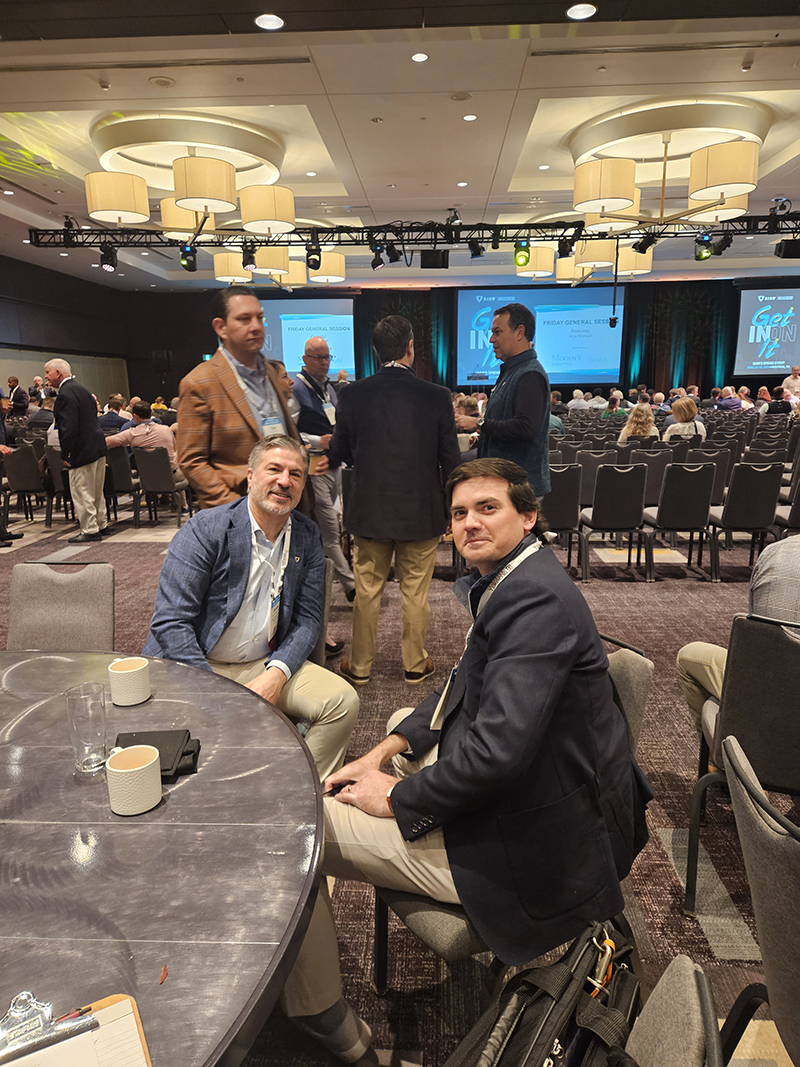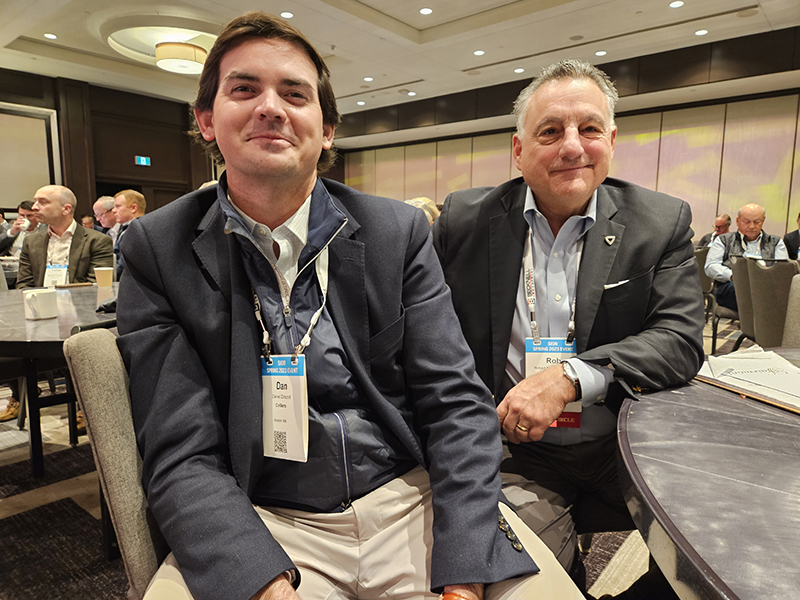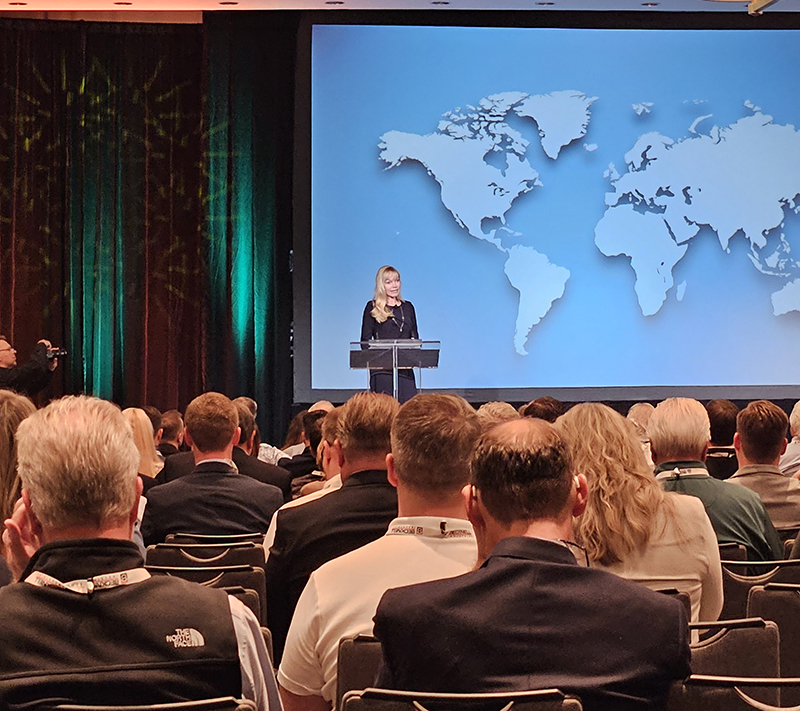Montreal, Canada SIOR held its first convention for 2023 in Montreal. Approximately 15 SIOR New England Chapter members and guests attended this event held at the Fairmont Queen Elizabeth. Over 830 people attended the April 26-29 conference. Wednesday, April 26 was full of social events while Thursday, April 27 was a full day of educational events. Friday had speakers in the morning and the afternoon was free to explore Old Montreal on a bright, sunny and warm day. 
On Friday, April 28, Anja Manuel spoke as a former diplomat and advisor on foreign policy. She is co-founder and partnered along with former secretary of state Condoleezza Rice; former national security advisor Stephen Hadley; and former secretary of defense Robert Gates in the firm Rice, Hadley, Gates and Manuel LLC. The firm is a strategic consulting firm that helps U.S. companies navigate international markets. She is also the author of “This Brave World: India, China and the United States.”
Here are the highlights of her presentation:
• COVID affected China’s GDP. Prior to COVID, China was running at 10-12% GDP. China is making a comeback on the GDP.
• China’s population is shrinking due to its 1 child policy. There are fewer people taking care of grandparents. Therefore they are saving money in case you need it in a downturn.
• China now has a more rigid system because of President JinPing.
• Consumer goods are doing well in China but computer chips are being decoupled.
• Even if the U.S. stops doing business with China, there are 110 other countries that have partnered with China.
• India is growing 7-8% per year and a great deal of China’s supply chain business has shifted to India. India is a closer friend with the U.S.
• In terms of globalization, it didn’t benefit everyone. The U.S. average white male with little education has a life expectancy that is 10 years less then educated males in the U.S.
• In terms of the future, it’s all about resiliency rather than efficiency. We need back up power and back up inventory.
 • Manuel thinks the next few years will continue to be a wild ride. Putin wants to be known as one of the greatest leaders of Russia, that’s his end game. China is partnering with Russia and Russia is in a long-term stalemate with Ukraine.
• Manuel thinks the next few years will continue to be a wild ride. Putin wants to be known as one of the greatest leaders of Russia, that’s his end game. China is partnering with Russia and Russia is in a long-term stalemate with Ukraine.
• Overall the USA will be fine and we will come together and support Ukraine.
• China also initiated in 2000, its Belt & Run Policy. China ended up with excess material in its quest to upgrade its infrastructure and selling to state-owned companies. So they are selling the excess material to other countries which is deflating prices. They are also selling to USA.
On Saturday, the speaker was Andrew Busch who spoke about the future of the economy. Here is the summary of his speech. Busch was the first chief market intelligence officer (CMIO) for the U.S. government at the Commodity Futures Trading Commission (CFTC). As CMIO, he was charged with improving and enhancing the government’s understanding of the markets. Busch provided briefings to White House, U.S. House and U.S. Senate staffers on a wide range of issues including the economy, stock market direction, interest rates and China’s influence on the global commodity markets. Busch created and directed a new research group, Market Intelligence Branch (MIB), for the agency. As CMIO, his job was to provide objective research on the financial markets to the CFTC, SEC, US Treasury and Federal Reserve. Energy, agriculture, interest rates and technology (Bitcoin, blockchain, AI) were some of the areas of research covered by the team. Prior to joining the CFTC, Busch was CEO and founder of a boutique financial markets and policy research firm, Bering Productions, Inc (BPI). Before BPI, he was the global currency and public policy strategist for Bank of Montreal (BMO) in Chicago.
• Why the big stock market rally? Busch stated that is the Jackass Forever syndrome in which the Federal Reserve never learns. During COVID, the Feds put $1.4 trillion into the economy. Checks were sent by ACH and not mailed so it immediately jacked up the economy. 70% of the economy is consumer spending and 70% of what the consumer is spending is on services and only 30% on goods. Services are impacted by the lack of labor.
• In 2021 the Feds knew there would be inflation from all the excess spending. The world inflation in 2020 was 1.9%, then 2021 was 3.4% and August, 2022 was 8%. Food is up 8.5% with inflation but the Feds focused on labor costs which is now difficult to find. Over one million jobs have been created but we lost four million workers. Of the four million, about one million was lost from death in the U.S. and half of the four million were workers. Now there is more pressure on labor availability.
• Feds are raising interest rates to get to 5.25% before they pause. They bought $5 trillion of securities and now have to put it back into the economy. They end up causing higher interest rates.
• The economy has softened with a high demand for services while manufacturing is collapsing. That might not be so bad since manufacturing rocked during 2020-22. It makes sense that it would slow down since demand of products has slowed down.
 • GDP dropped 1.1% in 1Q of 2023 because demand softened. FDIC took over First Republic. There was mismanagement of SVB. There will be a credit crunch in the next few months as mid-level banks will be scrutinized. Office real estate loans will be expiring and the debt money won’t be there for refinancing. Individual real estate however shows growth with ecommerce as ecommerce will grow 15% per year.
• GDP dropped 1.1% in 1Q of 2023 because demand softened. FDIC took over First Republic. There was mismanagement of SVB. There will be a credit crunch in the next few months as mid-level banks will be scrutinized. Office real estate loans will be expiring and the debt money won’t be there for refinancing. Individual real estate however shows growth with ecommerce as ecommerce will grow 15% per year.
• The USA future, Busch sees 2022 GDP at 2.1%, 2023 at 1.6% and 2024 at 1.1%. The Core PCE is 4.6% and the Feds want it to be at 2%. To accomplish 2%, the Feds will be forced to continue raising rates through 2023.
• The Infrastructure 11JA Act is still being allocated and has only started to enter the economy. Along with the Inflation Reduction Act, the feds are spending $1.7 trillion and it’s wasteful but the timing is great in a down economy. Hopefully the spending helps the overall GDP.
• The debt ceiling is a problem with the June deadline. Who knows where that goes?
• Work from home is averaging 1.5 days per week. Young people don’t know company culture since they don’t go to the office. It will affect the future.
Census shows losing populations in CA, NY and others while growing in AZ, TX, SC, NC and FL.
Near and Reshoring survey was conducted and 40% of assembly and manufacturing wants to come back to the U.S with China and Taiwan being unstable. Mexico and Canada will be the beneficiaries. EV will be a big demand product made in Canada and U.S. And recharging stations will be in demand. Since it takes 20 minutes to recharge, you will see restaurants sprout up around recharging stations or store fronts.
Ohio, MI and TN will be the area to build lithium batteries. It’s all about money flow to figure out the next growth and real estate move.
Oil future, if Ukraine doesn’t buy oil from Russia then China and India will thus fueling Russia’s ability to continue the war with Ukraine. When there is a price spike with diesel and gas, then you see food prices increase. If you pay more for fuel then you spend less somewhere else.








